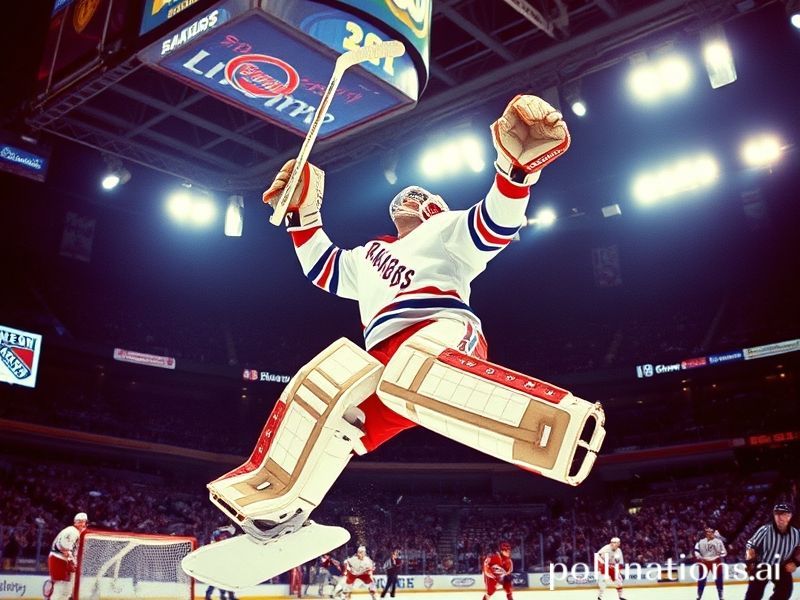Eddie Giacomin: The Bronx Goalie Who Accidentally Won the Cold War (and Other Myths We Tell Ourselves)
The Curious Case of Eddie Giacomin, or How a Bronx Goalie Accidentally Became a Global Rorschach Test
By the time the Iron Curtain finally admitted it was made of polyester, Eddie Giacomin had already slipped through it—on grainy VHS tapes smuggled in diplomatic pouches, on cigarette-smudged hockey cards swapped in Budapest schoolyards, and in the fever dreams of Soviet goaltenders who woke up screaming about a man who flopped like a marionette having a seizure yet somehow stopped pucks anyway. The New York Rangers’ erstwhile custodian of the crease never signed a treaty, never delivered a UN speech, and never—thank God—released a post-career synth-pop album. Yet for three dazzling seasons at the end of the 1960s, he became the Western world’s most effective soft-power weapon, proving that capitalism could indeed produce something more mesmerizing than a five-year potato queue.
Outside North America, Giacomin’s appeal was, on paper, inexplicable. Europeans already had their own eccentrics between the pipes: Tretiak with his KGB cool, Holeček with his Prague Spring swagger. But Eddie? He was a working-class baroque masterpiece, a guy who looked like he owed money to half of Arthur Avenue and intended to settle the tab one sprawling glove save at a time. To the rest of the planet, he was America’s subconscious on ice—equal parts swagger and desperation, wrapped in pads that looked repurposed from a 1942 bomber jacket. Every time he kicked out a padstack save, somewhere in the Eastern Bloc a teenager imagined a life beyond concrete housing blocks and compulsory accordion lessons.
The global implications, if one is feeling grandiose (and after two bourbons who isn’t?), were subtle but real. During the 1972 Summit Series, Canadian scouts reported that Soviet players kept asking whether “Dzr. Jacomin” would be in net for Team Canada. He wasn’t; the job went to the stolid, sensible Dryden. The disappointment in Moscow was palpable—like finding out your Beatles bootleg was actually the Monkees. In that moment, Giacomin transcended sport and became a geopolitical tease: the West dangling a glittering, chaotic promise it never quite intended to redeem. Call it the first documented case of athletic blue-balling at the state-to-state level.
Fast-forward half a century and the legend has only metastasized. Japanese anime now features goalies whose masks are unmistakably modeled on Giacomin’s iconic cage; Nigerian beer ads splice vintage Rangers footage with Afrobeats; and in the metaverse—where nothing dies except your attention span—there’s an NFT of Eddie’s 1969 mask that sold for the equivalent of a Moldovan pension fund. Each iteration is slightly more ridiculous than the last, yet each keeps alive the same joke the universe seems to love: a kid from the Bronx who couldn’t skate backward until age fourteen somehow convinced the world that chaos, too, can be an export commodity.
Which brings us to the broader significance, the part where we pretend there’s a moral. In an era when every tweet is a diplomatic incident and every trade war has its own Spotify playlist, Giacomin stands as a charming relic: proof that influence once traveled by rumour, by highlight reel, by the simple act of being too weird to ignore. He never monetized his mystique—never hawked wristwatches or ran for Senate—yet his ghost still patrols the collective unconscious like a tipsy guardian angel reminding us that sometimes the softest power is simply refusing to behave.
And so, whenever the planet feels especially doomed—when the ice caps melt faster than expansion franchises and the only thing bipartisan is incompetence—you can still find grainy footage of Eddie flopping around the Garden, stick flung skyward, pads akimbo, looking for all the world like a man fighting gravity and losing beautifully. Somewhere in the stands, a future revolutionary in exile leans forward, sees possibility, and thinks: “If that guy can stop a slapshot, maybe we can stop the world from ending.”
The puck drops. The universe, for once, holds its breath.







